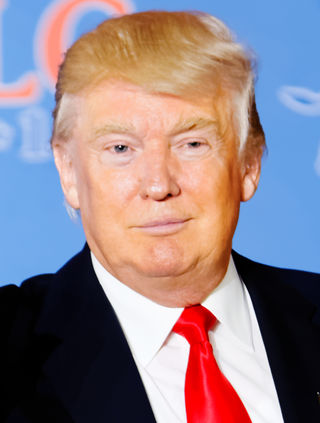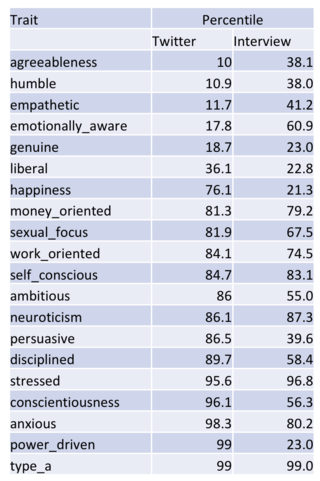Artificial Intelligence
Trump Psychoanalyzed by Artificial Intelligence - Part 2
A followup AI personality analysis of Trump based on his interview transcripts
Posted December 28, 2016

Earlier this week, I posted an artificial intelligence analysis of Trump's personality by analyzing his Tweets. Some of you emailed questions about how representative this text is. Tweets are a weird form of expression and some are written by others. Even with clues, it can be hard to tell which Trump wrote himself. So this is a followup that analyzes Trump truly speaking himself.
Remember - these are the results of algorithms that have error rates (see all the disclaimers in the original article). They aren't diagnostic tools. Indeed, this re-analysis shows where the algorithms have inconsistent output as the input changes.
I took the transcript of his interview with the Washington Post and extracted Trump's comments from the questions. I then fed that through the Receptiviti tool and my lab's coping style analyzer. The results came out as a match in some cases and quite different in others.
My coping style tool, which determines how well people deal with stress, concluded that Trump had a poor (maladaptive) coping style based on his Post interview. This was a change from the Twitter analysis, where it classified him in the "good" camp. This change is probably because his analytical thinking abilities appear much weaker in the Post interview analysis, which I discuss more below.
On the personality traits, a few new features popped up at the bottom of the scale that weren't there before. On having an analytic thinking style, Trump scored in only the 2nd percentile - lower than 97% of the population. If you read the text of this interview, you will likely agree that there is not a lot of analytic thought present in his answers, which tend to ramble. His workhorse spirit and independence also scored low (in the 8th and 14th percentile respectively).

There were also some differences in the traits discussed in the earlier post.
He came off as more agreeable, humble, empathetic, and emotionally aware in the interview. He didn't score very high on these traits in either analysis, but his scores from the interview were markedly higher. Anecdotally, that certainly is in line with how we often see people behaving online vs in person. It's much easier to insult people or to say aggressive things online when you are yelling into a void than when you are facing people directly.
In the Twitter analysis, Trump scored very high on being power driven, but this did not come off nearly as strong in the interview, where his score was only in the 23rd percentile.
You will notice many of the values in the chart to the left are pretty close in the Twitter and Interview columns. Trump's strong Type A personality comes through in both cases, and in many of the other traits, the percentile scores are quite similar.
Receptiviti's analysis of Trump's personality has also changed, highlighting new features:
Type A
Likely a workaholic with a very intense drive to succeed. May often talk over and interrupt other people, can be lacking in patience, frequently stressed, and may have a short temper.
Emotional thinking style
Tends to think in the here-and-now and bases decisions almost entirely on their feelings and intuition. Makes decisions quickly and may be resistant to changing their opinion.
Nonchalant
May procrastinate or wait until deadlines approach before getting started. Seldom puts in extra time to complete projects.
So what does it mean that we see some similarities and differences? First, the data that goes in to these algorithms solely determines the output. Spoken answers in an interview are quite different than tweets, so we would expect some differences. In this case, we see that Trump tends to come off more harshly online than he does in person. His tweets also appear more analytical and plan-oriented, where his interview answers are more emotional and show tendencies to procrastinate.
Which one is the true Trump? That is a sort of philosophical question. Is our true self the one we broadcast to win anonymous people over? Is it the one we show in personal discussions without the same ability to filter and edit? Undoubtedly, it's something deeper than both of those things. Which Trump is closer to the true Trump? Neither feel especially genuine to me (also supported by the genuineness score above which is quite low in both cases), but I think the thinking style from the interview is likely more accurate since is shows how Trump thinks in the moment.
Remember: Hilary Clinton is up next week, so stay tuned!




